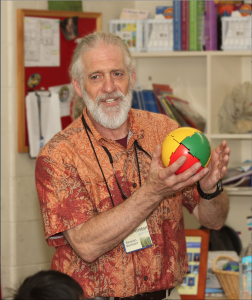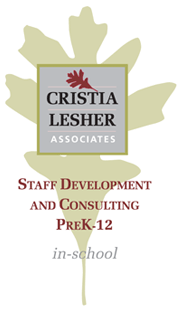The Five-Day, Single-School Math Residency for General and/or Special Education
Available as a Math Residency or Workshop and/or Consulting by Tom Schersten
Crunching the Math Common Core:
Visual Modeling and Problem-Solving
 A Math Residency is generally a week of training for teachers during school hours, starting with a demonstration teaching of topics chosen by the teachers. Participants see firsthand the classroom management of manipulative materials, as well as concrete activities that promote understanding and success in math. Model teaching is augmented by staff development and a Family Math Night. All lessons include handouts to facilitate implementation.
A Math Residency is generally a week of training for teachers during school hours, starting with a demonstration teaching of topics chosen by the teachers. Participants see firsthand the classroom management of manipulative materials, as well as concrete activities that promote understanding and success in math. Model teaching is augmented by staff development and a Family Math Night. All lessons include handouts to facilitate implementation.
The residency program is an intensive training for instructors of mathematics (kindergarten through geometry and algebra; general and special education) in problem solving and manipulative approaches to teaching the Common Core State Standards. Teachers observe lessons by the mathematician demonstrating a progression of activities from the introduction of a concrete material, through a series of interactions to develop skills, and finally to the transition to the abstract representation of the math concepts requested by the participants.
Tom provides the Common Core State Standards study guides for each grade level, as well as vertical articulations across grade levels of selected domains, such as Operations and Algebraic Thinking. Demonstration lessons are chosen to address particular Common Core State Standards and include teacher packets that explain the lessons and provide reproducible game mats and score sheets. Further, teachers are invited to contact the mathematician anytime they have questions related to math and math instruction.
The bulk of the week is a mix of demonstration teaching by Tom Schersten, augmented by staff training to answer questions about the lessons, take the lessons a few steps further, and discuss issues of general concern. A Family Math Night allows students to share with their parents what they have learned during the week and to approach some new activities together. This broad base of support facilitates the adoption and growth of the techniques introduced.
Scheduling the Single-School Residency:
Decide on your focus; choose what topics you’d like to see modeled and in what classrooms. (See Suggested Math Residency Topics below.) In order for classes to have time to develop concepts, they need to meet multiple times during the week. Hence, only 4 to 7 classes can be involved. Resist the temptation to try to include all students in the program! Spreading out the lessons to too many groups dilutes the focus, so that each progression of activities cannot be brought to fruition. What is gained in student exposure is more than lost in a less effective teacher training, the avowed purpose of the program.
Allow adequate time for concentrated math instruction. Sessions will probably be longer than your daily routine for math. Be flexible and creative in your scheduling to make the best use of Tom Schersten’s time. Suggested durations by grade level: 45 to 60 minutes for Kindergarten, 60 to 90 minutes for grades 1 through 3, and 75 to 120 minutes for grades 4 through 8 and above.
You will see in the Suggested Math Residency Topics which follow that each topic is followed by an indication of the time needed to present that topic. Remember to allow 10 to 15 minutes between sessions for transitions and 30 to 45 minutes for lunch. Most lessons will necessitate the use of an overhead projector and screen.
In order to maximize the benefit to your school, use subs to free up a larger group of teachers to observe each lesson. In some instances, teachers who have observed a lesson have returned immediately to their own classrooms to implement what they have just seen.
Remember to schedule a Family Math Night, so that families may be invited well in advance. The program is designed to show parents what and how their children have been learning. Light refreshments can help create a welcoming atmosphere.
Mail, email, or FAX a copy of the schedule you have created to Tom Schersten prior to your arranged residency. If class sizes exceed 24 students, please provide numbers.
These suggestions for planning your week are designed to make things run as smoothly as possible.
Suggested Math Residency Topics
Possible lessons include but are not limited to the following:
K – 2
Counting and number sense (2 – 5 sessions)
Early spatial experiences (2 – 5 sessions)
K – 6
Attributes, sets and logic (3 – 5 sessions)
K – 10
Problem-solving (2 – 5 sessions)
Geometry and spatial sense (2 – 5 sessions)
Games and puzzles (1 – 5 sessions)
Measurement (2 – 5 sessions)
Calculators (2 – 5 sessions)
2 – 4
Place value and addition (4 – 5 sessions)
Subtraction (4 – 5 sessions) Prerequisite: place value and addition
Money (4 – 5 sessions)
Time (4 – 5 sessions)
2 – 10
Permutations, combinations (2 – 4 sessions)
Probability (2 – 5 sessions)
3-D constructions (2 – 5 sessions)
Non-decimal bases (4 – 5 sessions)
3 – 6
Multiplication (4 – 5 sessions)
Division (4 – 5 sessions)
3 – 10
Fractions (4 – 5 sessions)
Tessellations (3 – 5 sessions)
Perimeter, area, volume (2 – 5 sessions)
Statistics (2 – 5 sessions)
5 – 10
Decimals (4 – 5 sessions)
6 – 10
Percentage, ratio, proportion (4 – 5 sessions)
Integers (4 – 5 sessions)
Solving equations (4 – 5 sessions)
Polynomials and powers (2 – 3 sessions)
Algebraic products, factoring (4 – 5 sessions)
Finite differences (2 – 3 sessions)
Note: The number of sessions is based upon student lessons of suggested durations:
K, 45 to 60 minutes; 1st through 3rd, 60 to 90 minutes; 4th through 10th, 75 to 120 minutes. Durations reflect the age of the participants and depth of treatment.

